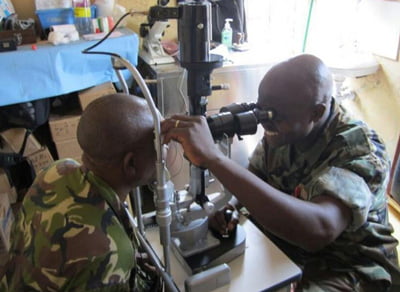Assessing the symptoms of post-Ebola syndrome to improve treatment
Posted: 12 April 2016 | Victoria White, Digital Content Producer | No comments yet
A study has assessed the effects of post-Ebola syndrome, that include vision complications, joint and muscle pain, and neurological problems, to improve treatments…


It’s a year on from the Ebola outbreaks in West Africa, and many Ebola survivors are now suffering symptoms of post-Ebola syndrome, including vision complications, joint and muscle pain and psychiatric and neurological problems.
To find out more about the broad-ranging symptoms of post-Ebola syndrome, a clinical team led by Dr Janet Scott and Dr Calum Semple, from the University of Liverpool’s Institute of Translational Medicine, assessed survivors discharged from the Ebola Treatment Unit at the 34th Regiment Military Hospital in Freetown, Sierra Leone. To better understand the neurological and psychiatric effects of post-Ebola syndrome, adult patients with predetermined, significant symptoms such as confusion, depression and psychosis, were identified from the patient notes of over 300 Ebola survivors.
Selected patients were invited to attend a joint neuro-psychiatric clinic where they underwent a full neurological examination, psychiatric screening and specialist investigations including brain scan imaging.
Dr Patrick Howlett, from the King’s Sierra Leone Partnership who collaborated with the University of Liverpool on the study, said: “We found a broad set of neurological and psychiatric symptoms, from minor to extremely severe, are present in Ebola survivors well over a year after discharge from hospital. In our selected group intermittent headaches were the most frequent neurological feature, with a variety of associated symptoms.”
Psychiatrist Dr Stephen Sevalie from the 34th Regiment Military Hospital, added: “Psychiatric features of insomnia, depression and anxiety are common and our findings suggest that there is a need for primary level neurological and psychiatric referral.”
‘Post-Ebola syndrome is not going away’
The opthalmology aspect of the study, led by Dr Paul Steptoe, examined 150 Ebola survivors with vision complaints. The patients underwent a number of ophthalmic assessments including a slit lamp examination to microscopically examine the eye in detail for any abnormalities. The findings reveal a more diverse range of eye complications in post-Ebola syndrome than previously reported, including cases of cataracts in young survivors.
Dr Scott added: “Post-Ebola syndrome is not going away and we are seeing people now, two years later, still suffering from the after effects of this terrible disease.
“The data in both sets of research supports the need for larger, case-controlled studies. Post-Ebola syndrome is not going away and those with the condition deserve better treatment, so we will continue to research and provide hands on support to ensure this happens.”
The findings of the study will be presented at ECCMID this week.
Related conditions
Ebola
Related organisations
Liverpool University



